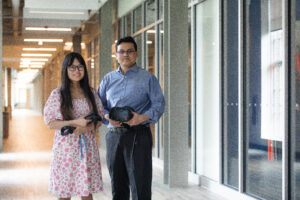
TCNJ Assistant Professor of Computer Science, Dr. Sharif Mohammad Shahnewaz Ferdous has been awarded a $175,000 two-year grant from the National Science Foundation to support his research program and to engage undergraduate researchers in his work. The title of his project is “Toward Understanding of Virtual Reality Sickness in Children”. The project will focus on understanding Virtual Reality induced sickness – cybersickness in children.
In recent years, Virtual Reality (VR) technologies have become more affordable and accessible to a diverse population, including children. Unfortunately, one of the biggest challenges for VR technologies is virtual reality sickness, also known as cybersickness. The most common cybersickness symptoms include eyestrain, headache, sweating, fullness of head, disorientation, vertigo and nausea. While much research focuses on cybersickness in adults, very few studies have been conducted in children. This project will focus on understanding cybersickness in children.
The Simulator Sickness Questionnaire (SSQ) is the most popular method of measuring cybersickness, even though some of the questions can be harder for children to comprehend. At the beginning of the project, TCNJ undergraduate student researchers will develop a web application that augments the existing SSQ with animation, making it easier for children. In addition, student researchers will be trained in recording and analyzing electroencephalography (EEG) results. Next, student researchers will develop a VR roller coaster simulation to study cybersickness using subjective (SSQ) and objective (EEG and heart rate variability) measures in children and compare them with adults. Lastly, researchers will investigate different virtual environment (VE) conditions (e.g., speed, angular speed, rotation, acceleration, change in lighting, change in contrast etc.) and their effect on cybersickness in children. Ultimately, student researchers will formulate the very first guidelines for developing VR content for children.
Additional information about Dr. Ferdous’s research can be found on his website.
Congratulations Dr. Ferdous!
